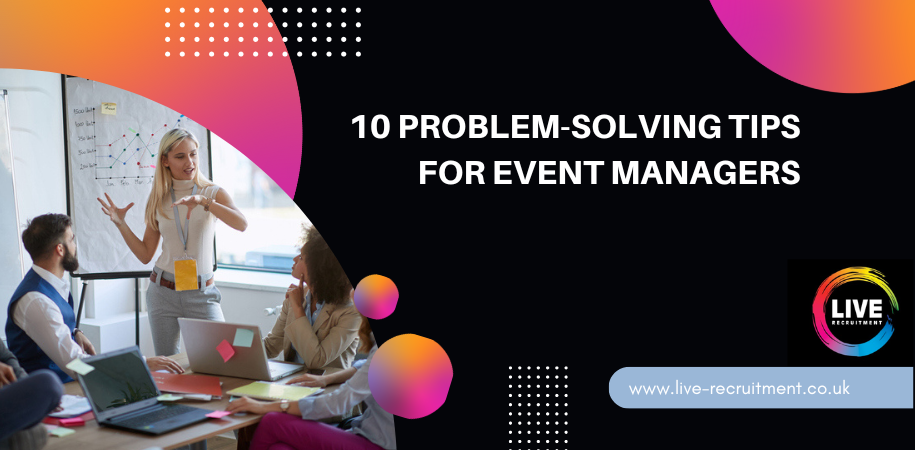Facing problems as an event manager is all part of the job. Being able to quickly adapt to new situations and manage issues as they arise is an essential part of running a successful event. With so many moving parts, an event is a very complex machine.
It wouldn’t be unusual for the event manager to have to deal with multiple problems throughout the event. So, if you’re an event manager looking to enhance your skills, consider the following ways to enhance your problem solving skills.
10 problem solving skills you need to know
Problem solving is a complex skill that not everyone takes the time to learn. For some people it comes naturally, but this doesn’t mean there isn’t more room for improvement. Being aware of how you can improve as an event manager is an excellent way to keep driving your career forward.
Don’t try to place blame
It’s tempting to want to look for who is at fault when something goes wrong, as this might make it clear who is responsible for fixing the problem. Drop this style of thinking and instead look at who can help to get things back on track. If you dwell on who is at fault, you’ll waste time that could be spent putting things right. Blaming someone won’t help to put anything right, but it can help to avoid mistakes in the future if you reflect on this at a later date.
Done is better than perfect
You might be a perfectionist, and you might want everything to go to plan, but you need to be willing to let some of this slide if you want your events to go ahead. Not everything will be perfect, but adopting the attitude that “done” is better than “perfect” will help you to avoid damaging your events in the pursuit of perfection.
Break down the problem
Attempting to tackle every problem head on will set you up for failure. Take each problem as it arises and break it down into smaller components. Some things might be able to be put to one side until later, allowing you to focus on the more pressing issues.
Ask for help
Before every event, decide who will be on your problem solving task force. These will be the people from each department that will be your point of contact if you need to fix an issue in their area. These don’t have to be the most senior individual in that department, just someone that you trust to help get things done.
Delegate effectively
It’s common for event managers to think they are delegating, when really they are just supervising a very large team and usually jumping in when they feel nervous that something might not get done. Instead of micromanaging your team, trust them to do their job and empower them to make decisions. With this sense of empowerment, they will be more likely to take pride in their role in such a way that allows them to act with more confidence.
Take regular breaks
You aren’t an effective problem solver if you are exhausted, hungry and dehydrated. Take regular breaks, even if it’s just a moment to have a sip of water and take a few deep breaths. Deep breathing exercises can help you to feel more calm and limit the damaging effects of stress. When you are stressed, you might struggle to make decisions and this will further aggravate your mood. By taking regular breaks, you’ll be a far more effective problem solver.
Be flexible in your approach
Flexibility is essential for running successful events. This could mean moving things at the last minute, changing the running order, or adapting to a last minute change of speakers or performers. When you take a flexible and adaptive approach to event planning, you’ll soon see that flexibility results in far better events. Learn to frame changes in a positive light so that no one notices when things don’t go to plan.
Learn to be resourceful
Think outside the box when you are facing an issue that appears complex or challenging. Think about the resources available to you and how they can be deployed to make your life easier. You don’t have to take the obvious route, there may be innovative solutions to your problems that aren’t right in front of you.
Do your research
It can be tempting to bring new technology on board to solve all of your problems, but this could end up creating more problems if you aren’t cautious in your approach. Do your research and make sure you know exactly what you are signing up for and how to use the technology before making any big decisions. You should also invest the time in training your team to work with new technology so that everyone can make the most of the benefits.
Take time to reflect
At the end of every event, take the time to reflect on what has happened, how you responded and how you can avoid the same issues in the future. This will help you to identify any potential areas where you need additional resources or training.
It will also help you to identify any skill shortages on your team that you need to address. And finally, it will also allow you to spot places where technology and automation might help you to streamline and avoid issues in the future.
Closing thoughts
If you want to improve your problem solving skills, you need to be thoughtful in your planning and resourceful in your execution. By anticipating problems before they arise and making sure that you have the right team behind you to assist with whatever might go wrong, you’ll be in a far better position.
You should also take everything as a learning opportunity, as self-reflection is one of the best ways to ensure you are continually learning and developing your skills as an event planner. Not every event planner is a natural problem solver, and many of them work hard to develop these skills so that they can continue to develop their careers.


